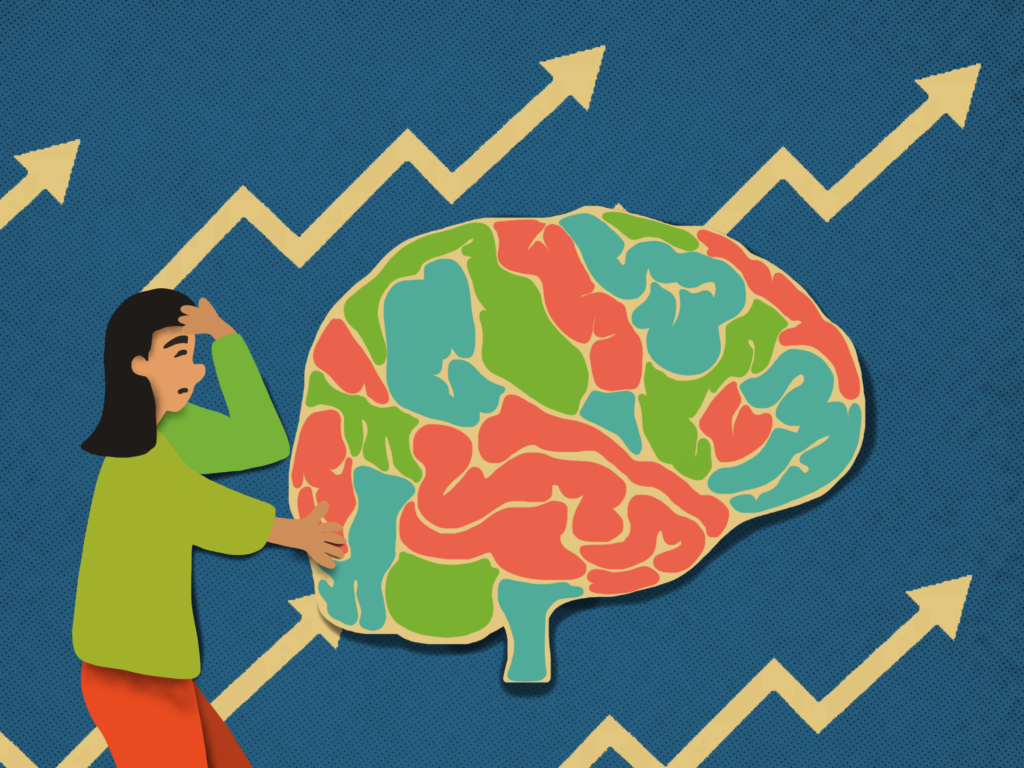
Graphic by Yujin Kim/The Choate News
Not only did Covid-19 shut down schools and prevent gatherings, but it also brought forth a crisis of mental health. The grief, anxiety, and depression that children have experienced throughout the Covid-19 pandemic is spreading into classrooms and hallways. Studies have shown increased crying and disruptive behaviors among younger kids and increased violence and bullying among teenagers. In 2020, the Center for Disease Control and Prevention (CDC) suspected suicide attempts increased by 31% from 2019. The closure of schools not only disrupted most students’ learning, but also uprooted students’ social networks and relationships with teachers.
As restrictions ease after the peak of Omicron, schools should consider ways to support students’ social and emotional needs as they reacclimate to in-person learning. Schools should place more emphasis on utilizing their existing systems such as establishing new screening processes to better target students in need of emotional help. On a wider scale, countries should place a higher priority on mental health services, integrate mental health services into health systems, and increase funding to train counselors and social workers.
According to the World Health Organization (WHO), the pandemic has severely disrupted or even halted critical mental health services — even as the demand for these services has increased. Roughly a billion people live with some mental disorder, and in low-income countries, more than 75% of people with these disorders do not receive treatment. There are multiple reasons that mental health does not receive enough attention. The first is related to the stigma that mental health is seen as nonessential, and more like an luxurious afterthought Other reasons include an outdated and fragmented service model or a shortage of human resources.
This mental health struggle is not just felt in the U.S. In Hong Kong, for example, where schools have closed due to the influx of Omicron cases, some children face serious challenges. DR? Zanonia Chiu, a registered clinical psychologist working with children and adolescents in Hong Kong, saidsays, “Now that schools are closed, some lock themselves up inside their rooms for weeks, refusing to take showers, eat, or leave their beds.” In the face of this challenge, Hong Kong has delayed the university entrance exams; authorities made a last-minute decision on March 21 to postpone the Diploma of Secondary Education exams to April 24.
The impact of mental health is not only felt in the health sector but also throughout every sector of a country’s economy. As a result, mental health links strongly with socio-economic agendas. The World Bank, an international financial institution that provides loans and grants to the governments of low and middle-income countries, has implemented a strategy to help countries achieve progress in Universal Health Coverage. In countries such as Cambodia, Niger, and Morocco, bank projects are supporting psychosocial interventions to help people combat negative emotional effects. In China, the National Planning Guideline for the Healthcare Service System promoted direct measures that include “the treatment and care of patients with serious mental disorders, improvement of mental health services and systems, and the dissemination of mental health education.”
The pandemic exposed healthcare systems across the globe as woefully inadequate. To combat this crisis, significant investments must be made. According to the WHO, every dollar invested in mental health yields 4 dollars in return. Mental health systems must be incorporated into existing health systems instead of as a separate issue. Another solution could be through the systematic screening of students to target those in need of emotional support. To better support students, schools should expand on existing health systems. School-based mental health professionals can provide direct support to students at risk of emotional issues that were identified through the screening.
The need to invest and expand on our current mental health system is more serious than ever. The pandemic has severely heightened on-going mental health issues and created new ones, and there are minimal resources for young children to turn to. Moreover, the pandemic has brought with it another major problem: mental health issues. Experienced most severely by children and teenagers whose social lives have been uprooted by the pandemic, there is a compelling need to invest and expand on our current mental health systems. Only through these changes can children and adults receive the treatment that they need and deserve.




